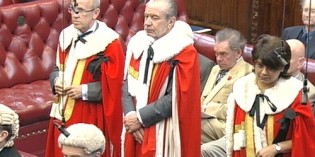Author Archive: democraticaudit

Lords reform: the problem of piecemeal constitutional amendment
How far is it possible to carry out piecemeal reform of a constitution when we do not know and cannot agree on the rules governing such amendment, and are not even clear about the nature of the constitution in question? Andrew Blick argues that the difficulties of affecting constitutional change in the UK are particularly […]

Select committee report shows way forward on voter registration
The Political and Constitutional Reform Select Committee’s 10threport of session, Individual Electoral Registration and Electoral Administration, has generated widespread media coverage. It is safe to say that a select committee report on electoral registration has never been awaited, and greeted, with such interest. Stuart Wilks-Heeg looks at the reasons why. The reason for the interest, of course, has […]

Who governs Merseyside? The significance of Heseltine’s new report
Anyone who took part in our ‘Who governs Merseyside?‘ event at the Bluecoat on 6 October will surely attest that the quality of the debate was exceptionally high. The ‘expert panel’ more than lived up to its billing, despite the fact that two of its members were unable to attend on the night. Yet, we barely […]

What say will voters have in redrawing of the electoral map?
The government’s contentious legislation to reduce the number of MPs and introduce a new system for drawing parliamentary boundaries was passed in February 2011. It set out an ambitious timetable for final recommendations to be voted on by the House of Commons in October 2013, which required some fast work by the Boundary Commission for England […]

What is the UK constitution made of? Exposing the ‘hidden wiring’
Late last year, the Cabinet Office published in draft form a document called the Cabinet Manual. Subtitled ‘A guide to laws, conventions, and rules on the operation of government’, it was initially intended by Gordon Brown, when instigating it as Prime Minister, as a possible first step towards a written constitution for the UK. This plan […]

Party funding reform: Canadian experience suggests a negotiated settlement is essential
Despite sweeping reform by the Political Parties, Elections and Referendums Act in 2000, the UK system of party funding regulation remains bedeviled by periodic scandal and pervasive public distrust. The case for further reform to detoxify the issue is now widely-accepted within all the major political parties, and has been echoed by a succession of official reviews. Stephen […]

News International and corporate power in Britain’s democracy: just the tip of the ‘unelected oligarchies’ iceberg
The News International scandal has rightly caused public outrage and led to a sea-change in relations between UK politicians and media moguls. Yet Murdoch’s empire has been only part of a much wider structure of unaccountable power which has exercised a dominant influence over British politics and policy making in the past two decades or […]

Reforming the constitution: process matters
Andrew Blick argues that policies impacting significantly on the UK constitution were central to the programme underpinning the formation of the Conservative/Liberal Democrat Coalition in May 2010. They include fixed-term parliaments; a reduction in the number of MPs combined with an equalisation in the population size of parliamentary constituencies; a referendum on AV; and a requirement for […]

Police reform: why democracy is not just about elections
Amongst the many pieces of legislation with important democratic implications the present government has introduced, the Police Reform and Social Responsibility Bill, currently passing through its final stages in the House of Lords, has received comparatively little attention. Yet it has fundamental constitutional implications. Andrew Blick argues that consideration of the bill helps illustrate the inconsistent – […]




 Democratic Audit's core funding is provided by the Joseph Rowntree Charitable Trust. Additional funding is provided by the London School of Economics.
Democratic Audit's core funding is provided by the Joseph Rowntree Charitable Trust. Additional funding is provided by the London School of Economics.